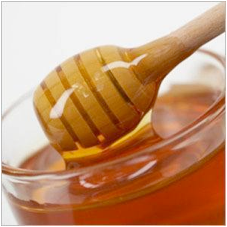Can I Give My Dog Honey?

Honey is quite literally a sweet gift from mother nature. It has many wonderful attributes, but is it appropriate to share this fantastic flower nectar with the family dog?
Pure honey, in moderation, is healthy. This applies to canines as well. There are, however, scenarios where it can be harmful. In particular, puppy dogs should not partake.
Botulism, while unlikely, is possible. Honey is also too risky for dogs with weak immune systems. Otherwise, it’s a great addition to a diet if you limit a pet’s portions.
It’s beneficial, but puppies can’t partake.
Think of honey as a nourishing natural sweetener. In fact, premium dog treats incorporate honey with other natural ingredients. There are even applicable medicinal uses for dogs which we’ll discuss. You can feed Fido a bit of honey but, remember, it’s mostly carbs and sugar. Consumption for canines needs to be strictly limited.
FYI: Raw honey is pure and unaltered meaning it hasn’t been heated, pasteurized or transformed with other ingredients. Deceptive marketing of honey is, unfortunately, widespread.
Moderation is a Must
Honey is much preferred to artificial sweeteners. Surprisingly though, it doesn’t actually contain essential nutrients. That said, the amino acids and enzymes are beneficial for dogs.
But honey is also overwhelmingly made up of carbohydrates (82%) and natural sugars. If you give pure honey, it’s recommended the amount be restricted to a teaspoon-sized taste.
Feeding your dog too much may cause an upset stomach or diarrhea. 1 teaspoon each day is plenty for pets.
Precaution for Puppies
If you have a puppy, avoid providing them with any amount of honey. Puppies have immune systems incapable of battling against the unlikely presence of botulism spores.
Bacterial and fungal infections are also concerns for vulnerable young pups.
May Alleviate Allergies
A spoonful of honey may help with allergies. While not conclusively proven, real honey always has a bit of pollen. This could acclimate a dog to pollinated air and the environment.
To put it another way, in theory, honey can build up a degree of immunity to pollen and the resulting airborne allergies. This outstanding benefit is applicable to dogs!
Better Digestive Health
Raw honey has thousands of valuable enzymes including Amylase. This means that honey can work as a sort of pet probiotic and help your buddy better digest foods.
Energy Boost and More
When a furry friend seems lazy, a little bit of honey can help. Raw honey’s natural sugars tend to provide a boost of energy.
Don’t be surprised if your pet pooch perks up. Honey makes more sense for active dogs since they can burn off the carbohydrates.
Many people don’t know that honey is also a natural antioxidant much like spinach. This means it may reduce an arthritic dog’s inflammation.
Conclusion on Honey
Adult dogs, but not puppies, can have honey. A teaspoon may aid digestion, reduce allergies and boost energy among other benefits. Limit servings since honey is high in carbs and (fructose) sugar. Pure, unheated, unpasteurized, organic, locally-grown raw honey is best but difficult to obtain. For consistency, we favor all-natural dog treats that contain honey as an ingredient.